Business
The Benefits of Outsourcing: How Sourced Supports Growing Businesses
Published
2 months agoon
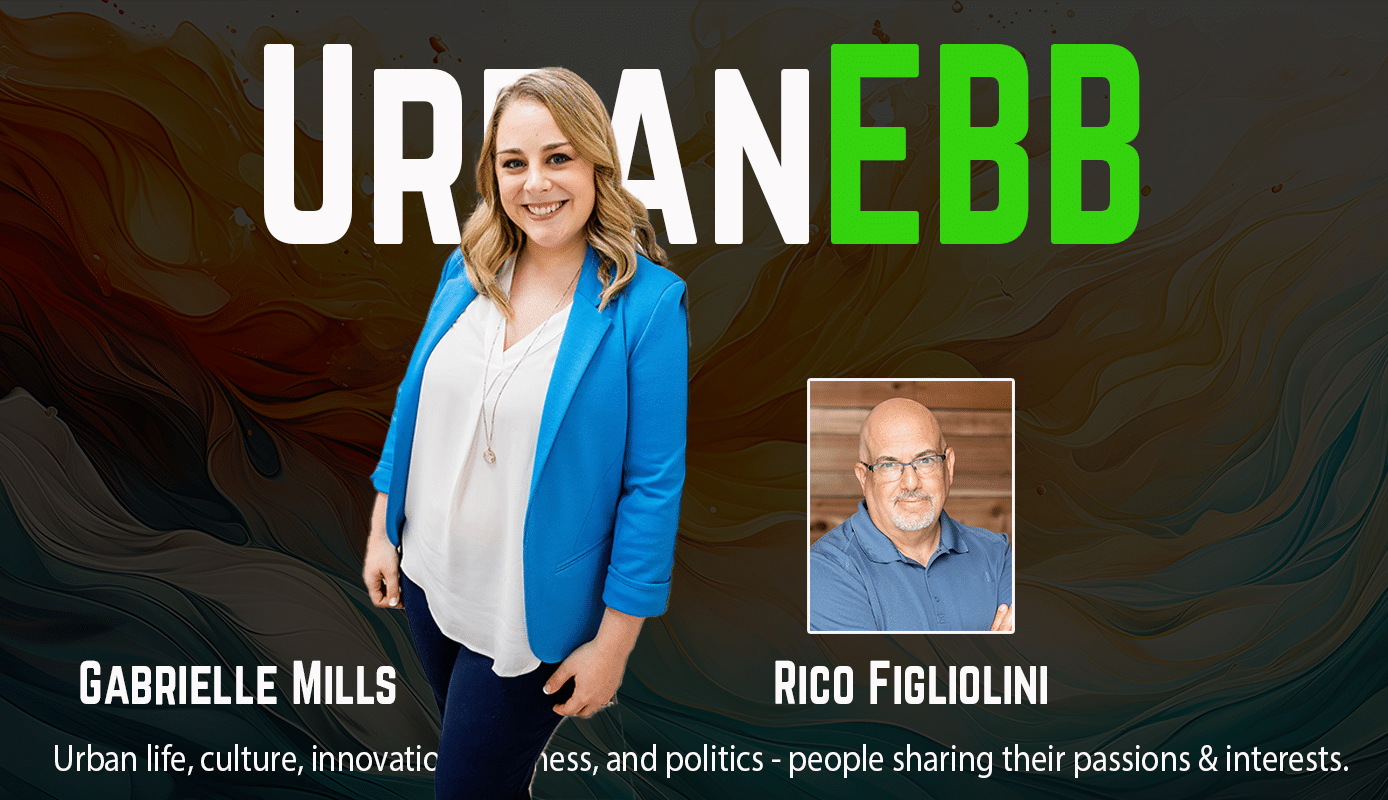
Join UrbanEBB host Rico Figliolini for a conversation with Gabrielle Mills, co-founder and CEO of Sourced, a full-service back-office firm supporting small to mid-market businesses. She shares how she and her mother built a company that provides accounting, marketing, HR, staffing, and administrative support—all under one brand.
Learn about the challenges entrepreneurs face with business operations and how outsourcing can provide the help they need. Gabrielle also discusses:
- A $12M business that never checked its financials
- The importance of trust in outsourcing key business functions
- The balance between people, technology, and business success
- Sourced’s commitment to giving back to local charities
Resources:
Sourced Website: https://getsourced.com/
Social Media: @SourcedATLGabrielle Mills
LinkedIn: https://www.linkedin.com/in/gabriellejmills/
Timestamp:
00:02:20 – Sourcing Solutions for Entrepreneurs
00:07:26 – Building Trust and Expertise to Serve Clients
00:14:53 – Fixing Broken Books for Business Owners
00:18:18 – Encouraging Diversity in Talent Acquisition
00:19:57 – Embracing Mistakes and Developing Processes
00:23:12 – Giving Back to Local Charities
00:25:34 – Leveraging Technology to Enhance People-Centric Services
Podcast Transcript:
00:00:01 – Rico Figliolini
Hey, everyone. This is Rico Figliolini, host of UrbanEbb here based in Peachtree Corners, Georgia. I appreciate you joining us. We’re a little smart city just north of Atlanta. I have a great guest here, Gabrielle Mills. She’s the founder and CEO of Sourced. Hey, Gabrielle. Thanks for joining us.
00:00:20 – Gabrielle Mills
Hi, good morning. Thanks for having me.
00:00:22 – Rico Figliolini
Yeah, no, I appreciate you being here. We’re going to learn a lot from you, I’m sure, this morning. And this is one of those freezing mornings here in Georgia that really never happens, like down to 20.
00:00:32 – Gabrielle Mills
It is so cold. I’m very cranky about it.
00:00:36 – Rico Figliolini
Yes, it’s amazing. But it’ll warm up in a week. But before we get to our interview, I just want to say thank you to two sponsors we have that have been with us. Appreciate the support of our journalism, these podcasts, of the magazines as well. One of them is EV Remodeling, Inc. They’re a company that has done work from design to build. whole house renovation, as well as just redoing your kitchen, your bathrooms and such. They’ve worked with over 260 families. They’re based in Peachtree Corners. Eli, the owner of the company, is a really great guy. I think you should check out their website. You could do a virtual consultation with them as well and check out their portfolio. So go to evremodelinginc.com and find out a little bit more about them. Also, our second sponsor is Vox Pop Uli, also based here at Peachtree Corners. They’re a company that takes your brand and brings it to life, essentially. They’re a family business, father, son, other family members in there, another daughter in there handling marketing. And even members of their employees are considered part of the family. It’s just a great, well-run company. We just did a podcast with them recently. You should check that out. But they try to bring your brand awareness out there. They can do anything from truck wraps to print on any object, just come to them, give them a challenge, and they will actually step up to that challenge. You might think they can’t print on it, but God knows they’ll find a way to do what you need to bring to that trade show and to make your business stand out as a retail operation or whatever. So check them out, vox-pop-uli.com, and it’s V-O-X-P-O-P-U-L-I.com. So now that we’ve gotten our sponsorships out of the way, Gabrielle, appreciate you staying with me like that. So tell us a little bit about how you started the business, why you chose the word sourced, and what the business is.
00:02:39 – Gabrielle Mills
Good morning. Thank you so much for having me. So I can’t tell you the answer to that question without acknowledging my business partner, Chrissy Strohmeyer, who is also my mother. So we are a mom and daughter team. We have just enjoyed the heck out of building this company together, but really my stories are her stories and vice versa. We started the business because we wanted to be entrepreneurs and we wanted to help other businesses grow and be successful. We think entrepreneurs are the salt of the earth people. They’re the reason for our economy. They create jobs. They’ve got so many great ideas. And they are the last people that get a helping hand because they don’t always have enough cash, right? That’s why we started Sourced. We actually went to business owners and asked them, because we didn’t have this idea. We asked business owners what they need, where they were underserved and how, if they were to do it all over again, kind of what they would do. And we put all of their answers up on a whiteboard that’s currently in our office. In fact, you saw it when you came over to our office the other day. If that whiteboard could talk, man. And we looked at all of their problems, all of their suggestions, all of the things they were struggling with. And our services came out of that. So Sourced is a back office services company serving small to mid-market companies. And the easiest way to describe what it is that we do is we basically have five businesses under one brand name. So on the fractional side of our business, we are a full accounting firm, full service accounting firm, a full service marketing agency, outsourced HR, administrative support. And then not fractionally, we do direct hire full time placement. So all of those ideas came from entrepreneurs that we spoke to that they needed help. And we said, we’ll do it.
00:04:38 – Rico Figliolini
It’s amazing. All under one roof.
00:04:42 – Gabrielle Mills
Well, we didn’t mean exactly to create five businesses at the same time. That was more of God’s plan. But, you know, here we are.
00:04:51 – Rico Figliolini
No, no, I can appreciate that. I’ve come across a lot of people in different businesses doing different things. So you do look at where your services can expand into. So it makes sense for where you guys are coming from.
00:05:04 – Gabrielle Mills
So you asked me where the name comes from. And I don’t get that question a lot. And it’s actually a really funny story. When I was working my big girl corporate job at IHG, Intercontinental Hotels Group, I had a relative that worked in the company. And she was the only person that knew that I was thinking about leaving and starting my own thing. So I floated the concept to her. And she loved the concept. At this time, we didn’t have talent acquisition. We only had a fractional client or fractional services. And our name was the Atlanta Assistance Group. And we were going to go by TAAG, T-A-A-G. And she was in branding for IHG. And she goes, I have to tell you, that name isn’t scalable. It’s easily forgettable. And you also have TAG, the Technology Association.
00:05:57 – Rico Figliolini
That’s right.
00:05:58 – Gabrielle Mills
And she’s like, I really think that you need to rethink your name. This was seven days before I was going to quit my job and do this and tell them I was going out. In which case they would want to know what the company is, what our name is, all the things. And so the next seven days, Chrissy and I were just on fire trying to think of everything. The amount of hours we spent digging through the thesaurus was crazy. And one day we were, I was driving and I was playing around with the word outsourced, resource, I was trying to come up with a play on words there and Sourced just came about and I called her and I was like, what do you think of this? And she’s like, I love it. And I think we came up with it two days before I quit.
00:06:48 – Rico Figliolini
Wow. And I love the website name though, getsourced.com. I mean, it just like makes sense to be able to do that. So, you know, you’ve been dealing with a lot of businesses, helping them and stuff. Sourcing is an issue sometimes, especially if you’re doing financial fractional work like that. And small business owners, maybe the larger ones like 10 million plus different, or even let’s say 5 million plus different, right? And I’m not sure what your sweet spot is, but the trust process to get a business to trust you to do their work because they’re sourcing it out to you. You’re not in the office. How do you do that? How do you gain traction with that? How do you gain their confidence to be able to provide the services that will make their business better?
00:07:37 – Gabrielle Mills
I think there’s a lot of ways that we do that naturally. First and most importantly, we have an amazing, amazing team of people and they really do the selling for us. Most of our business comes from word of mouth and referral because the people that work with us have such a great experience with our team and our people that that trust is kind of transferred already over because the referrer has had a great experience. That helps. Chrissy and I are involved in every single sale at this point before we pass it off to our team. We obviously have been through the entrepreneurial journey. We’re in our ninth year. We’ve done all the bumps and bruises, made all the mistakes. We’ve seen a lot of other people’s mistakes. We can kind of provide a lot of guidance during the sales process. So I think that builds trust. And not to be understated, the processes and the standards that we’ve built over time, we know how to fall back to the level of our training, regardless of the situation at hand. So we really lean into that when we’re talking to clients or prospects because they want to know how things are going to go. You can have a really good person who’s really friendly, but they may not know what they’re doing. That’s where the processes and our training comes in. We don’t have to do a lot of training because our people are already very experienced. But the way that we do things, we want that to be standardized. So we train on how the Sourced way is. So the client is experiencing something consistent.
00:09:14 – Rico Figliolini
So when you’re training, obviously, that’s an internal thing that you’re doing. There’s always industry trends, right? I mean, taxes is one thing where there’s always an update every year, different things going on. God knows probably this year will be a lot of things going on, accounting and stuff. But how do you keep ahead of some of the trends then or adapting to the needs of the entrepreneurs that you’re reaching out to? Because I’m sure that changes and evolves too.
00:09:42 – Gabrielle Mills
It does. I mean, you keep up with current events. We listen to our clients. Our clients know a lot. Our clients are very, very smart and we’re industry agnostic. So we get the benefit of seeing lots of different things from lots of different people and lots of different industries. So we just kind of like by osmosis learn things. But I think any good leader, regardless of if you own the business or you’re just working in the business or you have some kind of your stakeholder somewhere, I think anybody that is worth their salt is kind of always keeping up with. What’s going on and how does the business need to adapt and how does my department need to adapt and how do we grow and how do we improve? And I think just by having a regular practice like that, where you’re always kind of investigating it and looking at ways of improving, it’s more natural than it is forced to grow and change as the world changes.
00:10:37 – Rico Figliolini
Do you find going through the things you’re going through that, I mean, obviously, The day-to-day work is never-ending, right? It’s a process. Some days, some weeks, it’ll be the same as other weeks. But every once in a while, you get a challenge. You find something that you have to overcome within a business maybe, within your own business. Do you have any success stories that you can share that relates to that?
00:11:06 – Gabrielle Mills
Yes, I’ll tell you my favorite one. And it’s one of the more recent ones too. In our nine years of business, we have seen a lot come through our doors. We always tell people, especially those coming in for accounting. Accounting and talent acquisition are our two most popular services. And we started in accounting. That’s kind of our bread and butter. And people are always very vulnerable about like, oh, my books are bad. I had a bad accountant. I don’t know what I’m doing. We always tell them we’re like doctors. We just want to, give us the real, real, we’ll fix it. Like accounting is not a human body. So like we can actually fix it because it’s just numbers. But we’ve seen a lot of horror stories. You cannot scare us. You cannot surprise us. We’ve seen a lot in nine years. Recently, I think this client came on board early last year. And it was a $12 million construction client. And they have been in business for like 20 years or something. And when we were working on, we got referred into this client and we went and we talked to them and they were having an issue with their accountant that was internal. And they wanted to let that person go, but she knew way too much in the business. So they were like, we need somebody that can fix the craziness that’s happening in the books. And you can imagine they’re large books, $12 million company. We need to create some kind of redundancy in a situation where we need to let somebody go and we can’t, we’re beholden to them. And we just don’t know anything about our books. We’ve never seen them. And the best part of that meeting was that Chrissy asked, or she was talking about the financials, the financial reports. And the client stops her and she goes, wait, why do I need to look at my financial reports? And our jaws just dropped because this is a $12 million company. They’ve been in business for like 20 years. They have done a phenomenal job building their company. They had no idea the importance of their numbers. They didn’t know what their, like how their money was transacting. They, I don’t know how they were running it. And so that was a lot to overcome. It was probably one of our longer onboarding processes, but we got that client off of QuickBooks desktop and onto QuickBooks online so they could see their numbers, right. Their books were done and I’m not blaming this person that ended up leaving. There was reasons why this was, but the books were entirely backwards. So where there were things that should have been a positive, they were showing a negative and a negative should have been a positive. So all their numbers were backwards and then nothing was set up properly. So we had to do a whole setup. We had to clean the whole thing and we just had a meeting with them yesterday just talking about our usual check-in, how things are going. We’re constantly looking at improving this account. And they were just saying they have never felt more secure in an accounting firm. They said, regardless of how our team changes, you guys are our people. You’ve taught us, you’ve changed everything, you’ve done everything. And we just, they were showering us with lovely things and it just warmed our hearts so much because this was one heck of a undertaking. But I also, give them a lot of credit too, because that one, it was not a cheap project. And two, that took a lot of trust in them too, to be like, I don’t know you guys and you have to fix all of these problems at once. And it was a lot of work that they had to do and we had to do. And so they put a lot into the relationship as well. And it was, they’re probably one of my favorite clients now. And it’s, will probably be my biggest success story for a while, just from the scale.
00:15:01 – Rico Figliolini
Yeah, no doubt. I mean, I have a friend, Karl Barham, who owns Transworld Business. He consults, he buys and sells business for people. And it’s constantly amazing how many, not just half a million dollar companies, but $10 million companies, sometimes their books are so bad that they have to like step away and say, you know what, let’s fix this up. You may have to wait a year before you can sell this business just because the books are so bad. You know, it’s just like, there’s that.
00:15:31 – Gabrielle Mills
We don’t like to see it. Obviously it breaks our hearts and we can, we can fix it. We have the, we can fix anything at this point. But it’s unfortunate because they didn’t get bad because of that person. They got bad because that person didn’t have the support that they needed. Likely that the entrepreneur was not an accountant. They shouldn’t be. They should be building their business, doing whatever it is that they’re doing. Accounting is important, but this is why we went into businesses. You need to go do your dream. We’ve got the stuff that, yes, you need to keep up with, but you don’t need to know how to do it. We can show you, but you don’t need to know how to do this. You just need to know what your numbers look like.
00:16:19 – Rico Figliolini
Yeah, I’m surprised that when their accountant did their work at the end of the year, I can’t imagine it was the same person doing it. It had to be someone else doing it. And no one figured it out.
00:16:33 – Gabrielle Mills
Well, with this particular client, there was a couple migrations in systems that caused that reversal. So they started on one system and moved to QuickBooks Desktop. which reversed everything. And then the person that was working in the office, she would do a lot of things right. But there’s a lot of different ways to do accounting right, quote unquote. But she continued the backwardness because that’s how it had to be done. It was very complicated.
00:17:02 – Rico Figliolini
And I’m sure. And sometimes you’re down a path and you don’t want to leave that path. You just keep going and just figure it’ll work itself out at some point.
00:17:11 – Gabrielle Mills
That happens in accounting of like, we just start fresh. Like right now we’re getting a lot of clients that need cleanups and we only have to go back a month and a half because it’s the 21st today. When we’re in July, we’re like, okay, how far back do you want to go? Or not July, but more like October. They’re like, we can clean up from January or we can just hold off and start fresh in the next January.
00:17:36 – Rico Figliolini
Yeah. Okay. Well, that’s a tough decision. You said before you’re agnostic business-wise a little bit, but are there types of businesses that may benefit most from what you all do or that you target or that you’d prefer working with? Or have strength in those industries.
00:17:53 – Gabrielle Mills
We have developed patterns of clients that tend to come to us. So on the accounting side, we do a lot of construction. That’s the example that I gave. We have a couple of YouTube clients, which is kind of neat. We do a lot of work for attorneys. Accounting for law is very specialized. So we do that. On the marketing side, they’re completely across the board. There is no consistency whatsoever. Same with administrative support. HR gets thrown into any monthly recurring service that we have. So again, there’s no consistency. On the talent acquisition side, we have quite a bit of consistency. Although there’s randomness throughout. We do a lot in, we still do a lot in law. We get a lot of financial roles. So we do anything from accountants, tax managers, tax seniors. We do a lot in IT, particularly in the cybersecurity market. A lot in finance, some in construction, not really all that much. Did I say finance? Property management in talent acquisition. Yeah, those are about the consistent ones in talent acquisition. But again, we kind of see it all. At this point in our business, we actually get really excited when we see a business or an industry that we’ve never worked in before. So for marketing, I was just pitching a client yesterday who’s opening a shooting sports facility and gun range. I have never done that before. And I was like, oh, this is different. This is unique. We’ve got research. Same with anything in our talent acquisition department. If it’s different, we’re like, okay, this is exciting. Because usually, I mean, we just see a lot of businesses come through here.
00:19:48 – Rico Figliolini
Well, that’s cool. Yeah, especially when you see a lot of different businesses like that. We talked about success stories. As a business person, I think any business person, if they’re honest with themselves, will say, yes, we make mistakes every once in a while. New situations arise that they’ve never seen before and it’s a problem that they have to overcome. Have there been any mistakes in your business journey or that you’ve seen in other businesses besides, obviously, the accounting issue? But anything that you’ve overcome as an entrepreneur, as a business person?
00:20:27 – Gabrielle Mills
No, Rico, we’re absolutely perfect. We’ve never made a mistake.
00:20:30 – Rico Figliolini
I could see that.
00:20:34 – Gabrielle Mills
Oh gosh no. I tell people, people ask me about our journey a lot. They’re just curious about our story and how we came to be. And we love telling it. I always tell people, Chrissy and I didn’t have experience in any of these things before we started. We just had a dream and wanted to be, help businesses and build a business ourselves. All of this we have learned from the ground up, having no experience with the exception of like general business acumen and general sales acumen. But we’re not accountants. We are not recruiters. I did start in marketing, but not tactically. So I always say that I went to the school of hard knocks, got a couple of degrees from there. And that’s how I got to where I’m at because we’ve made every mistake in the book. We’ve had clients that have trusted us and loved us through some mistakes that we’ve made to get us to where we are. I would say the biggest piece of advice or mistake that I made that I learned from was Chrissy came into the business from day one. And she was telling me and our director of account management, Maureen, she was like, we’ve got to focus on our processes. We’ve got to focus on our processes. Maureen and I were focused on the people and just serving the people. And in year three, which was our hardest year yet, we got so many different challenges and scenarios that were really, really difficult. And what Chrissy was telling us from day one finally got through to Maureen and I of like, oh, this is why we need processes and standards. This makes sense now. So it took a lot of heartache to really understand why those are important. But now it has been the secret sauce to our business because we know how to hire off of them. So if people aren’t already operating or have experience with that certain frame of mind, we know that they’re likely not a fit or they have to be at least willing to be coached into that direction. We’ve developed consistency because our process is our standard. We’re always making our processes better. We’re always looking to make them beefier. We never would have gotten there if we didn’t learn that lesson.
00:22:53 – Rico Figliolini
And sometimes you do. I mean, you have to learn your lesson. It’s like bringing up kids. They want to do their own mistakes. They don’t want to be told to watch out for that step. And they’ll do their own mistakes.
00:23:04 – Gabrielle Mills
She was a broken record there for a few years. And then the light bulb finally went off. And Maureen and I were like, oh, okay. Now it took us some tears to learn it. But we got there. Now we’re on there.
00:23:19 – Rico Figliolini
I’m sure. So you’re a local business. Obviously, coming out to meet with you and your mom and the rest of the team was nice to take a tour and find out what you’re doing there. You do give back. I know you’re good people. You’re giving back to the community. Why don’t you tell us a little bit about some of the local charities that you’ve given back to?
00:23:45 – Gabrielle Mills
So early in our business, we decided that we’re not in business, we’re in business for the joy of being in business. We’re not in business to make a gazillion dollars and cash out. While that would be lovely, we would totally not turn our noses up at that. We wanted to at least serve our clients and then serve people that never really came into contact with Sourced and use the business as an opportunity to give back because we believe that if we’re successful, we have been giving blessings and so we should be giving blessings out. So we committed from day one that we were going to donate 10% of our monthly profits to charity. And those charities would be selected by our team of people. So every year, in December, we put out a survey to our team. And our team can nominate a charity that is important to them. And we decided in January, up to three charities that we’re going to give to that year, and every quarter we look at each month that we’ve made profit, take that pool of money, cut it by, divide it out equally across however many charities we have that year and give them out. We have served, some of those have been large organizations, but our favorite ones are the ones that are smaller and local. We started the first couple of years working with an organization called Connections Homes, which is out of Suwanee. They help kids who are aging out of foster care really like with support to become adults, but also they’re not really adults. They’re 17, 18, 19, and they still don’t know how to do the world. That’s an organization that we’ve supported. We’ve supported an organization called Ignite Hope, which is another foster care association. We’ve done neighborhood cooperative ministries, which is a, for those who are local, you guys know that it’s a very large nominal nonprofit here in Norcross. And this year we’re partnering with an organization called Because One Matters, which ironically is another foster care organization. I just realized that there seems to be a pattern. So we tend to give to the kids.
00:26:08 – Rico Figliolini
No, I like that. I like the fact that you’re giving locally and it’s 10% of your profit each month is what you split up, which is great. It’s almost like tithing in a way.
00:26:18 – Gabrielle Mills
Yeah. And that’s how it came about. We wanted to tithe using the business. We give once a quarter based on the months because what we didn’t want to do is we would have one month go to one charity and that was a particularly good month. But then the next month maybe wasn’t that good of a month. So we wanted to balance it out. So we look at all the profits that come in from the quarter and then equally disperse it.
00:26:39 – Rico Figliolini
That is cool. Alright. We’ve gotten sort of to the end of our interview time, but I’m sure that there’s things that we could talk a lot more about. Is there anything that I’ve left out? Anything you’d like to share? Maybe services that you may be looking at expanding into the coming year or anything along those lines?
00:27:00 – Gabrielle Mills
So we’re likely not expanding into other services because we have five already and that’s enough. We are finding that there’s a lot of growth to be had in our talent acquisition department. So we’re eager to see what that ends up looking like through the year. What we really want to focus on in terms of like diversification or innovation, which I think is really where your question comes from, is how we utilize technology to make our services more streamlined and more advanced. We will never not have the support of our people. We are a people business. We will go under before computers take over our jobs. However, there’s a lot of really great technology that if you use it right and smartly, we can make profit margins better, save our clients money, be able to reach more people. So we’re going to try to figure out how we can lean into that a little bit.
00:28:02 – Rico Figliolini
So that’s a great path to go down for a quick minute, maybe. Because AI technology is something that everyone, every business is tackling and using in a variety of ways, right? ChatGPT, Grok3, there’s a bunch of them. Claude, I mean, there’s a whole bunch. DeepSeek, I mean, you could just go on and on with these things. And every business, every industry is trying to figure out how they can use that, right? And some use it badly and others use it better. Sometimes it’s used for support or for research versus making decisions. So are you finding that you have to also look at that to augment or to add a complexity to the service you provide?
00:28:52 – Gabrielle Mills
So what stands out in your question to me is the have to. I think that nobody really has to, but I’m in an industry that if I don’t look at it, my industry will die because it is based on people. And if you don’t lean into the technology, you run the risk of the world thinking they don’t need people anymore. And then you’re obsolete. So we don’t have to do anything. But if we want to stay in business, we should be looking at how to utilize it better. The beauty of our business is these are things that people are always going to need. And computers can’t replace entirely. You always need a person overseeing or creating or some version of managing what the computer does. So we always have a people element to it. What we’re looking at with technology is how do we make ourselves and our processes and how we do things better and faster using technology and use the human brain where the human brain needs to interject.
00:30:01 – Rico Figliolini
Yeah. Okay. Great explanation. Well, we’ve reached the end of our time together. Where can people find out more about your company? Of course, we’ll have it in the show notes as well, but how can they reach out to you?
00:30:14 – Gabrielle Mills
Yeah. So if you’re local, just come and see us. We are off of Scientific Drive in Technology Park, down by the Forum. If you want to check us out online, we are at getsourced.com. We’re on all the socials under SourcedATL, or you can always just look at my name, Gabrielle Mills. Unfortunately, very easy to find out on the web.
00:30:39 – Rico Figliolini
I’m sure. Check her out on LinkedIn. It’d be easy to find her there. I want to say thank you again to EV Remodeling and to Vox Pop Uli for supporting us. Everyone else, you have comments, leave them in the comment section below, depending where you’re watching this, whether it’s Facebook, YouTube. If you’re listening to this on Apple or any of the audio podcast places, Spotify, leave a review, like, share. We’d love if you would support us that way. Gabrielle, thank you for being with us. Appreciate it.
00:31:13 – Gabrielle Mills
Thank you for having me.
Related
Business
Two Peachtree Corners Business Leaders Named Finalists for EY Entrepreneur Award
Published
2 weeks agoon
April 23, 2025
Ernst & Young’s Entrepreneur Of The Year celebrates ambitious entrepreneurs who are shaping the future
Ernst & Young LLP (EY US) recently announced the finalists for the prestigious Entrepreneur Of The Year 2025 Southeast Award, and two local, Peachtree Corners business leaders — David Quirk, president and CEO of DLB Associates Consulting Engineers PC and Erin Hanson, founder and CEO of Guardian Sports — made the list.
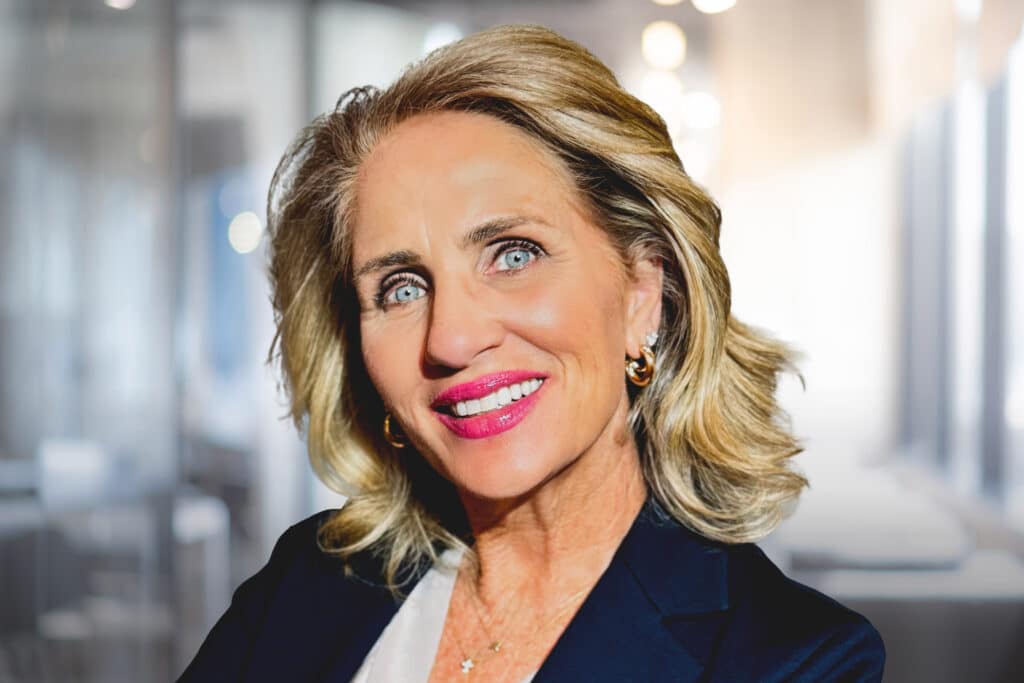
Hanson’s Guardian Sports is a family-owned company dedicated to serving athletes through safety and performance improvements in sports equipment. Major products include the Guardian Cap, PEARL ball and Guardian Infill serving the sports industry.
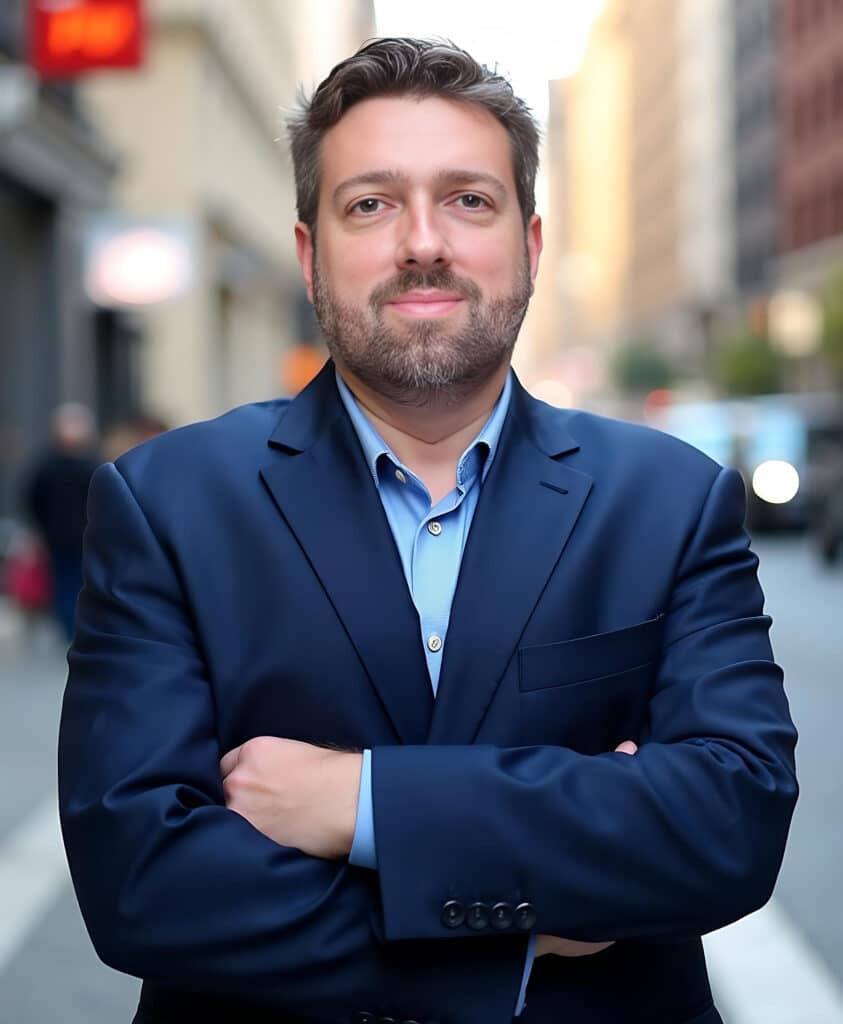
DLB Associates is a U.S.-based consulting engineering firm specializing in mission-critical and complex built environments. With more than 40 years of expertise, DLB delivers innovative, technology-driven solutions in engineering, commissioning and operations worldwide.
Celebrating entrepreneurial leaders
Now in its 40th year, Entrepreneur Of The Year recognizes the bold leaders who disrupt markets through the world’s most ground-breaking companies, revolutionizing industries and making a profound impact on communities. The program honors those entrepreneurs whose innovations shape the future and pave the way for a thriving economy and a hopeful tomorrow.
The Southeast program celebrates entrepreneurs from Alabama, Georgia, North Carolina, South Carolina and Tennessee.
An independent panel of judges selected 36 finalists for their entrepreneurial spirit, purpose, growth and lasting impact in building long-term value.
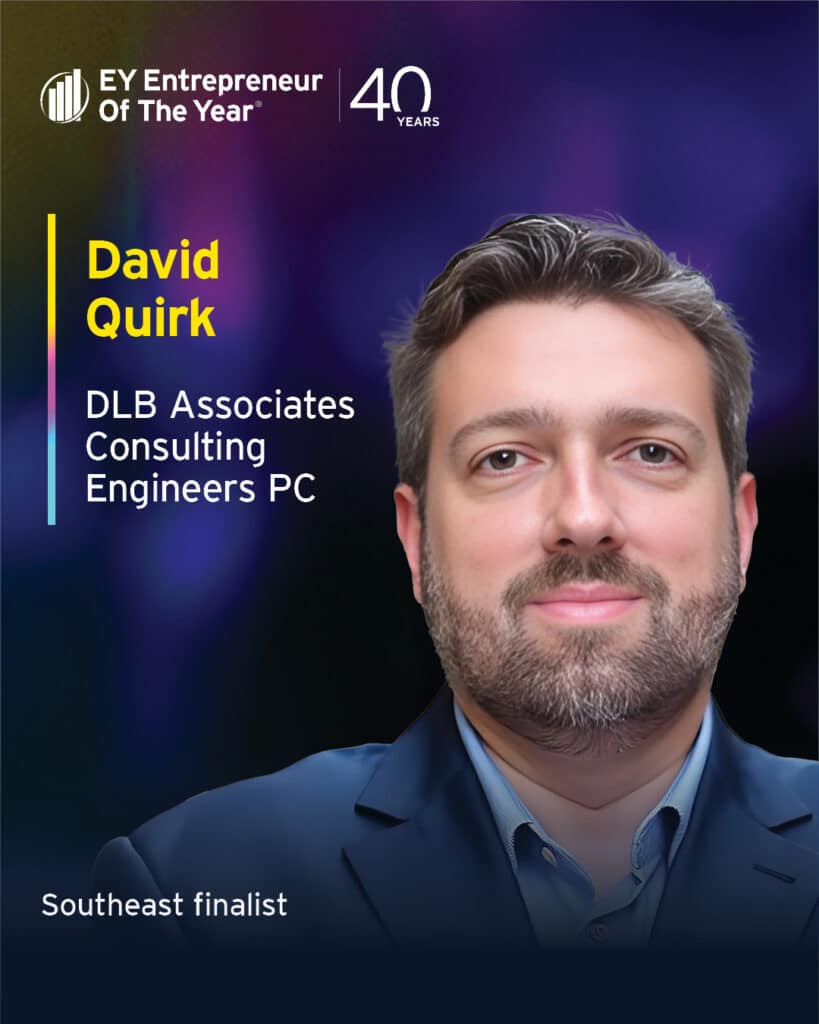

“This year’s finalists are leading examples of innovation, perseverance and resilience, illuminating paths to a brighter future for their industries and communities,” said Chevy Arnold, Entrepreneur Of The Year Southeast Program co-director.
“Their commitment to excellence transforms challenges into opportunities, inspiring us all,” added Kimberly Kicklighter, Entrepreneur Of The Year Southeast Program co-director.
Entrepreneur Of The Year honors many different types of business leaders for their ingenuity, courage and entrepreneurial spirit.
The program showcases original founders who bootstrapped their business from inception or who raised outside capital to grow their company; transformational CEOs who infused innovation into an existing organization to catapult its trajectory; and multigenerational family business leaders who reimagined a legacy business model to strengthen it for the future.
Including Quirk and Hanson, the 2025 Southeast finalists are:
- Marc Hodulich | 29029 | Atlanta, Georgia
- Damon Stafford | Alpine Intel | Charlotte, North Carolina
- Lou Hensley | Aspida | Durham, North Carolina
- Matthew Dent | Buffalo Rock Company | Birmingham, Alabama
- Melanie Little | Colonial Pipeline Company | Alpharetta, Georgia
- Will Bartholomew | D1 Training | Franklin, Tennessee
- Rene Diaz | Diaz Foods | Atlanta, Georgia
- David Quirk | DLB Associates Consulting Engineers PC | Peachtree Corners, Georgia
- Markus Scott | EyeQ Monitoring | Atlanta, Georgia
- Jon Gosier | FilmHedge | Atlanta, Georgia
- John Fitzpatrick | Force Marketing | Atlanta, Georgia
- Dr. Barry Patel | Galt Companies | Atlanta, Georgia
- Dr. Wade Smith | Galt Companies | Atlanta, Georgia
- Charles Gillespie | Gambling.com Group | Charlotte, North Carolina
- Kevin McCrystle | Gambling.com Group | Charlotte, North Carolina
- Mike Griffin | Griffin Brothers Companies | Cornelius, North Carolina
- Erin Hanson | Guardian Sports | Peachtree Corners, Georgia
- Dan Beem | Hissho Sushi | Charlotte, North Carolina
- Aaron Siegel | Home Team BBQ | Charleston, South Carolina
- Marc Murphy | Ignite Digital Services | Charleston, South Carolina
- Miller Chalk | Inglett & Stubbs, LLC | Mableton, Georgia
- Liza Rodewald | Instant Teams | Southern Pines, North Carolina
- Stephen Andresen | McClancy Foods & Flavors | Fort Mill, South Carolina
- Travis LeFever | Mission Mobile Medical Group | Greensboro, North Carolina
- Cyrus Mojdehi | Northway Homes | Charlotte, North Carolina
- Connor Ryan | NutraSky | Alpharetta, Georgia
- Fritz Owens | OTR Solutions | Roswell, Georgia
- Christopher Chuang | Relay, Inc. | Raleigh, North Carolina
- Kurt Jacobus | restor3d, Inc. | Durham, North Carolina
- Tom Kendrot | Shearwater Health | Nashville, Tennessee
- Teak Shore | Southern Lighting Source | Cumberland, Georgia
- Cindy Eckert | Sprout Pharmaceuticals | Raleigh, North Carolina
- Bryan Moore | TalkShopLive Inc. | Nashville, Tennessee
- Tina Moore | TalkShopLive Inc. | Nashville, Tennessee
- Igor Marinelli | Tractian | Atlanta, Georgia
- Joan Butters | Xsolis | Franklin, Tennessee
You can learn more about the finalists at ey.com/en_us/entrepreneur-of-the-year-us/southeast/winners-finalists.
Regional award winners will be announced on June 25 during a special celebration. The winners will then be considered by the national independent panel of judges for the Entrepreneur Of The Year National Awards, which will be presented in November at the annual Strategic Growth Forum®, one of the nation’s most prestigious gatherings of high-growth, market-leading companies.
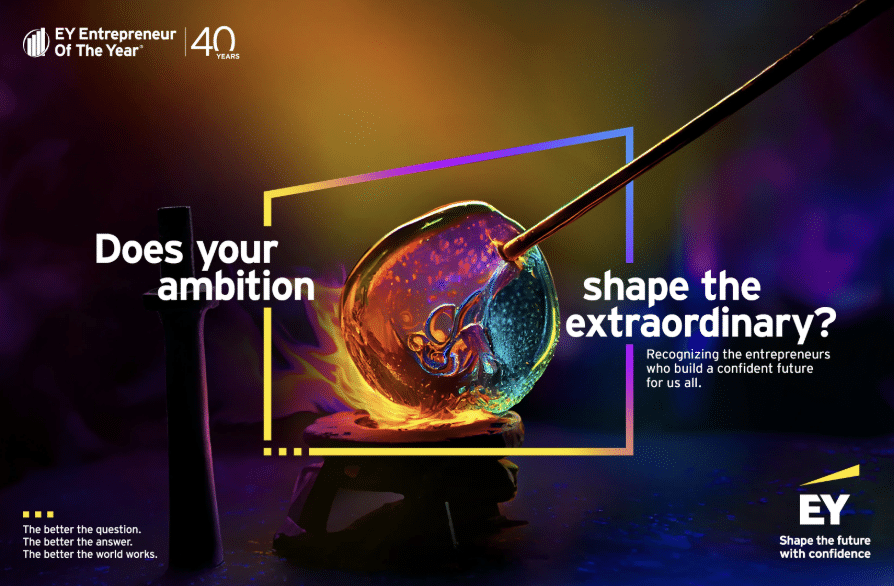
About Entrepreneur Of The Year
Founded in 1986, Entrepreneur Of The Year has celebrated more than 11,000 ambitious visionaries who are leading successful, dynamic businesses in the U.S., and it has since expanded to nearly 60 countries globally.
The U.S. program consists of 17 regional programs whose panels of independent judges select the regional award winners every June. Those winners compete for national recognition at the Strategic Growth Forum® in November where national finalists and award winners are announced.
The overall national winner represents the U.S. at the EY World Entrepreneur Of The Year™ competition.
For more about the award, visit ey.com/us/eoy.
Related
Business
SCB Construction Group Partners with CGA Reps on New Peachtree Corners HQ
Published
3 weeks agoon
April 15, 2025
SCB Construction Group, freshly rebranded from SteelCo, secures construction project with CGA Reps for new office HQ in Peachtree Corners
SCB Construction Group has announced a strategic partnership with CGA Reps to build a new office headquarters in Peachtree Corners. The project, encompassing approximately 26,000 square feet of innovative workspace, marks a significant milestone in advancing CGA Reps’ corporate vision while showcasing SBA Construction Group’s commitment to delivering transformative construction solutions.
In collaboration with Oakley Real Estate Partners — serving as developers of the project on behalf of CGA Reps — this venture reflects a united effort to bring cutting-edge design (from Smallwood architecture firm) and operational excellence to the commercial kitchen equipment industry.
The announcement follows several high-profile projects for SCB Construction Group in 2024, including a 72,500-square-foot manufacturing center and headquarters for Process Equipment & Controls, an impressive interior build-out for Courtesy Ford Conyers’ commercial service center and the Phase 1 completion for StoreEase Loganville — recently honored as a 2024 Smart Facility of the Year by Modern Storage Media.
A bold new chapter for CGA Reps
The new 25,890-square-foot headquarters is designed to be more than just a workplace — it is envisioned as an inspiring environment that serves both client engagements and employee creativity. CGA Reps is recognized as an industry expert in commercial kitchen equipment, representing leading manufacturers, warehousing, distributing and installing everything from fryers to commercial walk-in freezers.

The facility’s design reflects this expertise, featuring a dedicated approximately 9,000-square-foot showroom kitchen that will host equipment demonstrations, tradeshows and webinars. This dynamic space will allow CGA Reps to showcase its comprehensive product range and provide clients with hands-on experiences of the latest commercial kitchen innovations.
A standout feature of the project is its innovative approach to stormwater management. With the site comprising only three acres, sufficient space for a traditional detention pond does not exist. To overcome this challenge, the design includes an underground detention system located beneath the truck court to efficiently handle all stormwater runoff.
This solution not only maximizes the use of the available land but also reinforces CGA Reps’ commitment to sustainable practices.
“We are excited to embark on this project with CGA Reps,” said Jay Bailey, CEO of SCB Construction Group. “This partnership underscores our commitment to customer excellence in design and construction, and it is a testament to the trust our clients place in our ability to deliver projects that not only meet but exceed expectations.”
Delivering excellence through proven expertise
SCB Construction Group’s track record in 2024 has been nothing short of remarkable. Earlier in the year, the company completed a 72,500 square foot manufacturing center for Process Equipment & Controls, integrating office space within a dynamic production facility.
This project was celebrated for its innovative design that balanced operational efficiency with a modern aesthetic, utilizing IMP panels to mimic tilt-up concrete, setting new standards for manufacturing environments.
Similarly, the interior build-out for Courtesy Ford Conyers’ commercial service center demonstrated SCB Construction Group’s ability to transform conventional spaces into functional and attractive environments that cater to both customer and staff needs.
The company’s commitment to quality and precision was again evident in the successful Phase 1 completion for StoreEase Loganville. This project, which recently earned the distinction of a 2024 Smart Facility of the Year by Modern Storage Media, highlights SCB Construction Group’s forward-thinking approach to construction and design, incorporating smart technologies and design that enhance sustainability and operational efficiency.
A rebranding that reflects a vision for the future
In a move that signals its evolution and growth, SCB Construction Group has recently rebranded from its former identity, SteelCo Buildings, as it spins off its construction division. This strategic rebranding is not merely cosmetic — it represents a renewed commitment to capabilities, credibility and client-focused service.
The refreshed brand is anchored by a new tagline “Deep Expertise, High Expectations” and a clear brand promise that communicates the company’s mission: to craft exceptional construction experiences based on precision, innovation and trust.
“Our rebranding is about more than just a new name or logo; it’s a renewed promise to our clients and communities,” explained Robert Lee, marketing director at SCB Construction Group. “We believe that our updated brand identity, including our invigorated tagline and mission statement, encapsulates our dedication to pushing the boundaries of design and construction. It reflects our commitment to creating spaces that are as inspiring as they are functional.”
Transforming spaces to inspire and connect
The new headquarters for CGA Reps is expected to become a landmark facility in Peachtree Corners. Beyond its impressive architectural design and advanced construction techniques, the building is planned as a hub for innovation and collaboration.
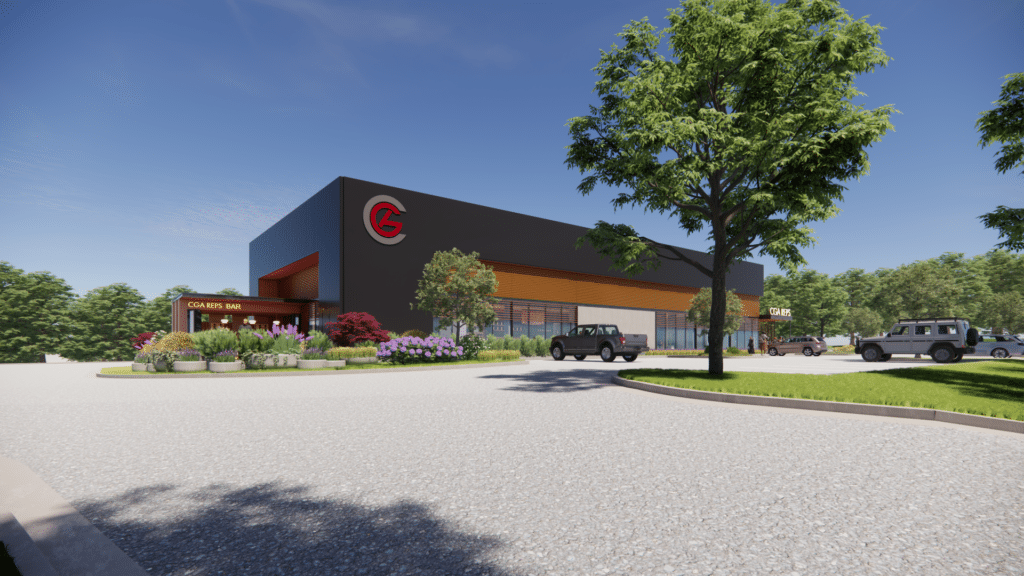
The interior build-out will include dynamic client reception areas, interactive meeting rooms, and dedicated spaces designed to foster creativity and teamwork among employees. The layout is crafted to ensure that every area of the facility contributes to a productive and inspiring work environment.
“By investing in this state-of-the-art facility, CGA Reps is making a strong statement about the future of work,” said Bryan Young, VP of construction at SCB Construction Group. “Our team is dedicated to designing and building spaces that not only serve the immediate needs of our clients but also create environments that motivate and inspire. The new headquarters will be a testament to that vision.”
Looking ahead
The partnership between SCB Construction Group and CGA Reps marks a significant step forward for both companies. As SCB Construction Group continues to build on its legacy of excellence and innovation, this project is poised to set a new benchmark for modern office headquarters design in the region.
With a strategic focus on creating spaces that inspire, connect and drive success, the future looks promising for both SCB Construction Group and its esteemed partner, CGA Reps.
For more information on the new headquarters project or to learn more about SCB Construction Group’s portfolio, visit scbcg.com.
Related
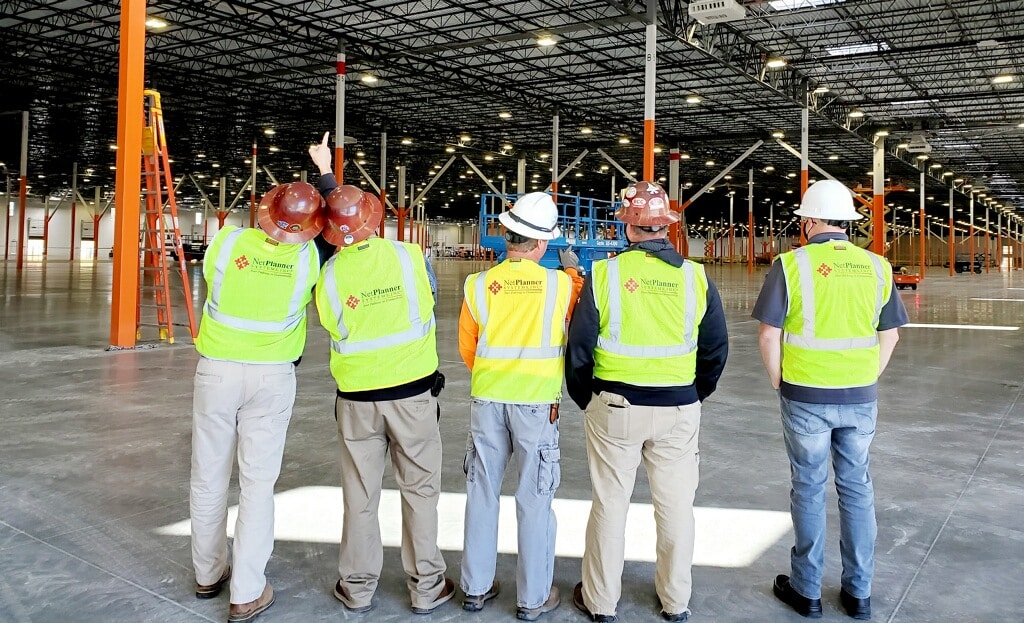
How NetPlanner Systems powers businesses with tech-forward services and solutions
Anyone who’s been in business for more than a decade — maybe even less than that — can attest to the changes one must make to stay relevant. Such is the case with NetPlanner Systems.
During a discussion recently with Southwest Gwinnett magazine, CEO Clint Bridges explained that NetPlanner was an outgrowth of another company he started in 1983, initially in Mableton and later moved to the Peachtree Corners/Norcross area in 1985.

The first company manufactured printer and modem cables, which were in high demand during the early personal computer market boom. The company transitioned from manufacturing to providing networking services in 1987 due to the shift in the market and the desire to stay in a service-oriented business.
“Those cable assemblies sold for higher margins in the early days of the PC market. Rapidly, a lot of that manufacturing went offshore, and the margins went down, and a number of my competitors decided just to become brokers in that field,” said Bridges. “I didn’t really want to become a broker. I am very technical, very hands on, and so I sold that first business in 1986.”
Services and market reach
The contacts and trust he’d built with customers prompted him to go another route.
“Local area networking was starting to come into the marketplace, and so instead of manufacturing cable assemblies, we started to do networking, which involves putting network cabling and related hardware into commercial buildings,” he said.
NetPlanner built some of the earliest networks in the area.
“This was back in the days before there were any standards for this,” Bridges added.
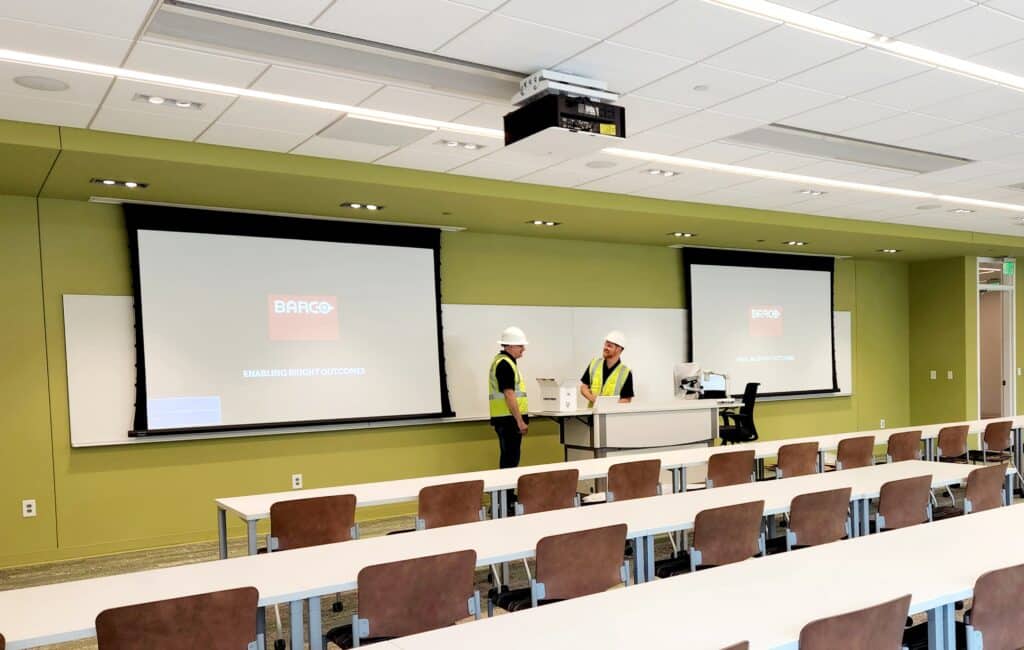
Today NetPlanner provides complete design services, installation and ongoing maintenance of all communication systems in commercial buildings, focusing primarily on hardware. The company also runs a network services division that offers help desk support for small businesses without their own IT departments.
“That’s what really caused NetPlanner to be formed in 1987 — the desire to be in a service business and to provide a service that was still working with the same sorts of clientele in the computer marketplace,” he said.
NetPlanner works with a variety of commercial enterprises, as well as K-12 schools, colleges, universities and large hospital systems.
“Everything that wasn’t on the IP network in a commercial building before 1990 started to fall onto the IP network,” said Bridges. “Things that we never anticipated, including telephone systems, which were totally separate back in the 1980s, now all operate over IP-based systems.”
In addition, things like security and access control, video surveillance and similar systems all work on IP networks.
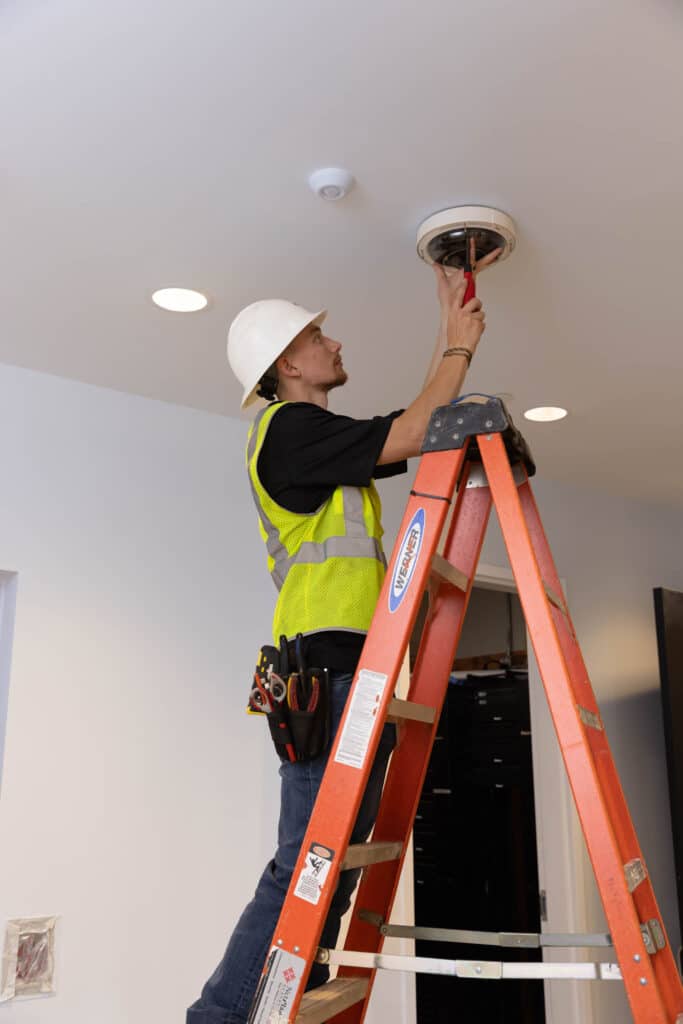
“So as time has gone on, NetPlanner has received requests from our customers to install these other systems, and we’ve embraced the other technologies that are now a part of almost all commercial buildings,” he added.
The company is now expanding its services to include nurse call services for hospitals — one of the newer markets for NetPlanner.
Security and access control systems
With ever-changing business technology needs, NetPlanner successfully keeps current with trends. With heightened security concerns everywhere, the company installs biometric readers and smart camera systems for access control.
“We provide a wide variety of smart camera systems, where they can do recognition, license plate recognition, facial recognition — all those kinds of intelligent systems for commercial spaces,” he said.
Building relationships with a wide variety of manufacturers who provide different types of software systems is how NetPlanner meets the needs of its clients.
“We work with whatever software system the particular enterprise feels is most appropriate for their needs, depending on whether they want to do license plate recognition or face recognition,” said Bridges. “We do a tremendous amount of security camera work in schools all over the southeast. And that is becoming more top of mind in school systems now.”
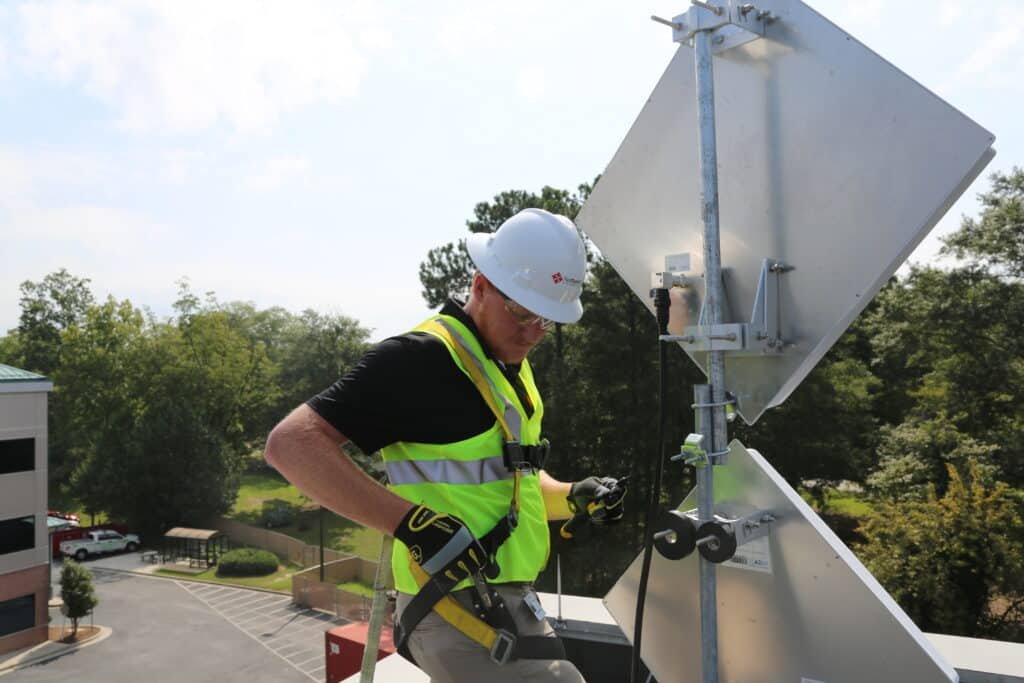
But there’s more. NetPlanner also provides distributed antenna systems (DAS) to improve cell phone coverage in commercial spaces.
“Cell carriers are concerned about not just signal strength, but also channel capacity — the ability to have a much larger number of users that might be around a particular cell tower at any given point in time,” said Bridges.
When installing a DAS, NetPlanner’s proficiency in coordinating with the carriers ensures compliance with carrier requirements and optimizes signal strength and coverage throughout the building.
Evolution of the technology-driven company
Anyone who knows Clint Bridges shouldn’t be surprised that he’s right in the thick of the technology boom. He started his first company at 19 and attended Southern Tech for a while before focusing on entrepreneurship.
“My passion for technology goes back to my earliest years. I’ve been fascinated by electronics and computers since I was very young. And I always had a home laboratory in the basement of the house as I was growing up,” he said. “I knew when I was in high school that I wanted to be an entrepreneur. During my time at Southern Tech, I started my first company and realized that’s what I wanted to do more than be at Southern Tech.”
NetPlanner is not only a local company. It operates fully-staffed branch offices in Augusta, Columbus and Savannah, as well as in Nashville, Tennessee; Raleigh, North Carolina; and Tampa, Florida. It has also provided services in every U.S. state, as well as parts of the Caribbean, Canada, London and Puerto Rico.
“We do projects all over the country, including some that are for companies that need to do national rollouts,” Bridges said. “A lot of our customers want to see the exact same approach used consistently throughout all their facilities across the country. So they’ll look to a company like NetPlanner to go and provide that consistent installation of all their communications technology needs in all their facilities across the country.”
Community commitment
Whether it’s working with manufacturing facilities and distributors, some of the largest big box organizations in the country, small retail businesses or anything in between, NetPlanner never loses sight of the local community.
With a home base in Peachtree Corners, the company has strong community involvement — including adopting a roadway section for clean-up efforts and participating in local chamber of commerce activities. NetPlanner has been active in several community events, such as shoe drives, food drives and charity walks, demonstrating its commitment to giving back.
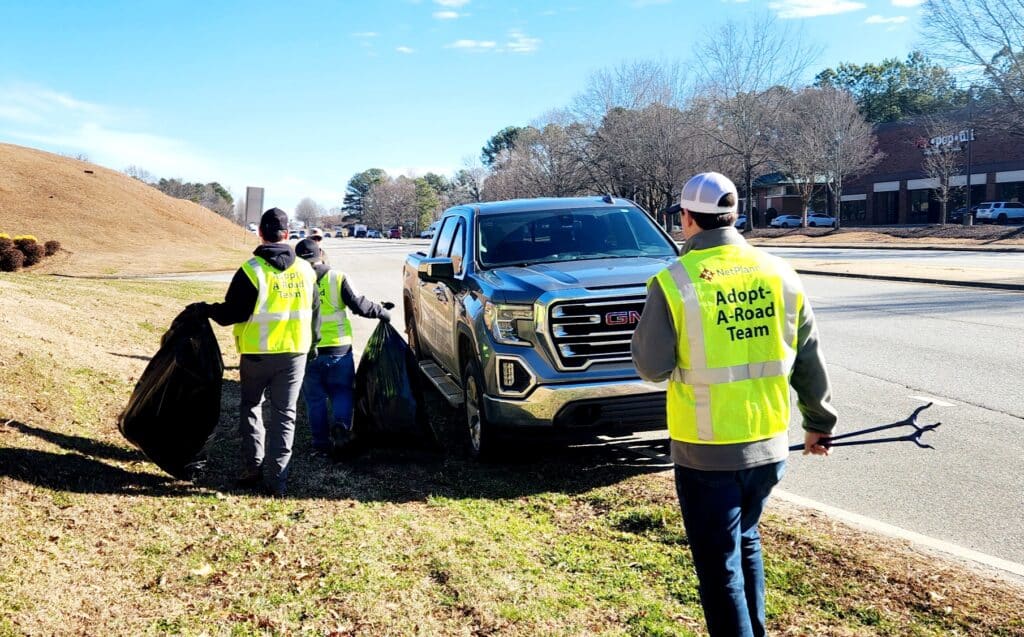
“Since 2018, we’ve adopted a roadway section in the community through Gwinnett Clean and Beautiful,” said Michelle Bruck, marketing specialist at NetPlanner. “We go out about five times a year, clear debris off of that roadway and just make sure that it’s beautiful and that it’s safer for people who are walking or driving in the area.”
Nationally, NetPlanner participates in Toys for Tots and Walk to End Alzheimer’s.
“Not only [do we give back] in our headquarters location, but all of our branch offices look for ways to help, get involved and support our communities that we’re part of,” Bruck added.
NetPlanner’s marketing efforts include social media, direct marketing and trade shows, with support from Vox-Pop-Uli for branded materials and printed media.
“When we first started using Vox-Pop-Uli, we had just a straightforward vendor relationship, but they very quickly became a partner to us,” said Bridges. “Vox-Pop-Uli has actually set up a company store on our behalf where our employees can purchase branded material, branded clothing, ball caps and those sorts of things. And they also handle printed media — things that we would use at trade shows.”
Looking forward
With technology moving at a warp speed, NetPlanner relies on a lot of repeat business.
“Bandwidth requirements are increasing year after year,” Bridges said. “Fiber optic cabling that we might have installed 10 years ago won’t support the data rates that are needed today, so it needs to be changed out in many cases.”
Many of the customers that he’s been with for several decades use NetPlanner’s services over and over.
“We’ve gone into the same building and re-cabled it over and over again as the different category levels of copper cabling have advanced,” he said. “The demands on fiber are now way beyond what they were even five years ago because the capacity has increased so much.”
And as everyone is embracing artificial intelligence, Bridges said he’s working to keep up.
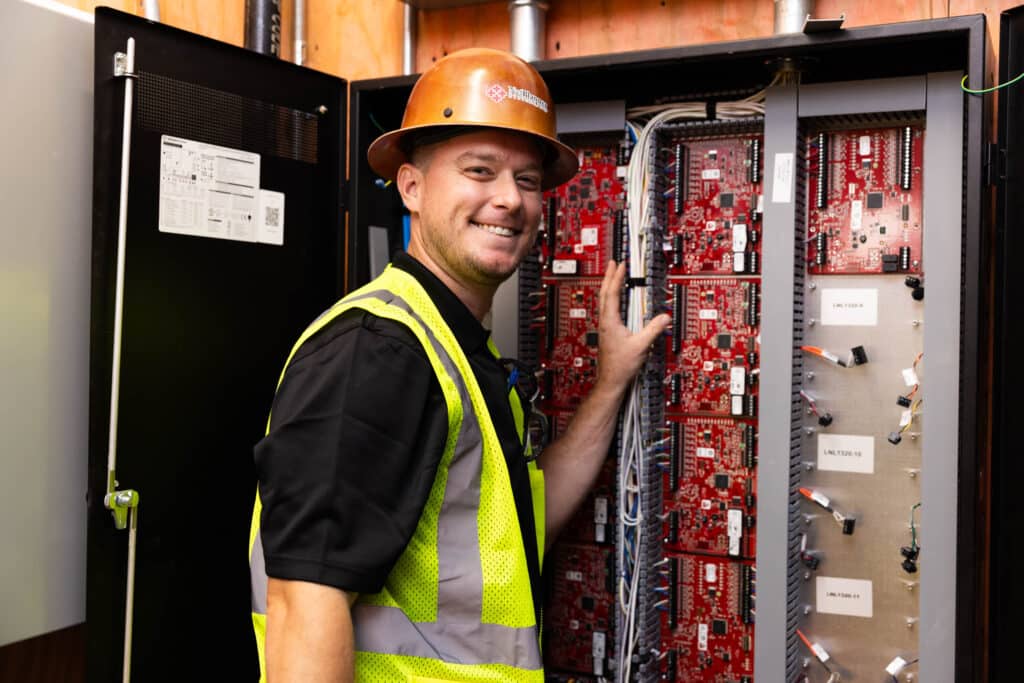
“Everyone is well aware of what’s happening in the artificial intelligence space. And what’s really amazing to us is the number of new data centers that are being built across the United States by all the major players,” he said. “It’s kind of hard to imagine even being able to keep up with all that. We do a lot of data center work ourselves, and are trying to engage with more of our customers to help build some of these newer data centers.”
He added that the artificial intelligence boom is causing so much additional strain on the network infrastructure across the country, there are concerns about how it’s all going to be powered.
“I think everyone’s concerned,” he said. “Everyone that’s involved in this is wondering how we’re going to meet the bandwidth demands, the capacity demands, the power demands to make all this work.”
Staying ahead of the curve
With decades of experience, Bridges offers advice for all types of businesses starting out — put technology needs into your business model early on.
“The companies that struggle the most with technology are the ones that wait until after everything with the building is developed and completely built before they realize that they need Wi-Fi or some other network installation done,” he said. “It’s just a much more efficient process if we’re involved as early as possible to help design the network, along with the building structure itself.”
He also emphasized the importance of staying ahead of technological advancements to avoid falling behind.
“As fast as technology moves, if you get behind the power curve, it’s really hard to catch up,” he added.
The Local Thread: This business profile series is proudly supported by Vox-Pop-Uli, championing local stories and the communities we serve.
Related
Read the Digital Edition
Subscribe
Keep Up With Peachtree Corners News
Join our mailing list to receive the latest news and updates from our team.
You have Successfully Subscribed!

GA Tech, Peachtree Corners Solidify Partnership with First-of-its-Kind Venue

Peachtree Corners City Guide 2025: Spring/Summer Digital Edition

Two Peachtree Corners Business Leaders Named Finalists for EY Entrepreneur Award

GA Tech Launches First-of-its-Kind GT Atrium in Peachtree Corners

Katherine Lafourcade — A Journey of Passion, Resilience and Giving Back

PCBA Announces 2025 Scholarship Winner

Paul Duke STEM High School Student Earns CGO Scholarship

Digital Edition

Digital Edition

World Blood Donor Day Starts Here: Theo’s Miracle, Katherine’s Mission [Podcast]

Paul Duke STEM High School Student Earns CGO Scholarship

PCBA Announces 2025 Scholarship Winner

Katherine Lafourcade — A Journey of Passion, Resilience and Giving Back

GA Tech Launches First-of-its-Kind GT Atrium in Peachtree Corners

Peachtree Corners City Guide 2025: Spring/Summer Digital Edition

Two Peachtree Corners Business Leaders Named Finalists for EY Entrepreneur Award

Light up the Corners [Video]

Capitalist Sage: Business Leadership in Your Community [Podcast]

Cliff Bramble: A Culinary Adventure through Italy

Top 10 Brunch Places in Gwinnett County

A Hunger for Hospitality

THE CORNERS EPISODE 3 – BLAXICAN PART 1

Top 10 Indoor Things To Do This Winter

The ED Hour: What it takes to Remove Barriers from Education







